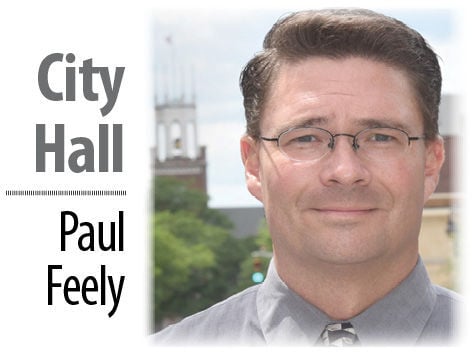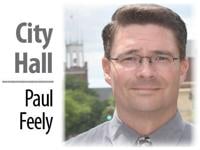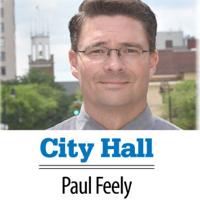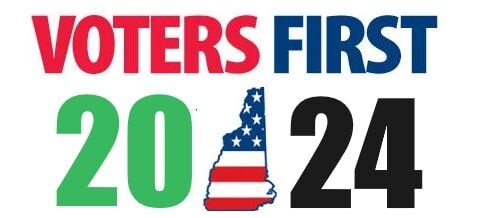ONE OF THE MORE interesting aspects of Mayor Jay Ruais’s first ‘State of the City’ speech on Wednesday — other than the big reveal that he was once in a high school choir called the “Testostertones” — was his speaking openly about his own recovery from alcoholism, as he did many times while campaigning for the job.
Ruais said, “God willing,” he will celebrate 14 years in recovery from alcoholism on March 9.
“After years of struggling with my drinking, I knew I had to make a change,” Ruais said. “I have a great deal of empathy for those on our streets who may be dealing with mental health or addiction-related issues, because I know it could have been me.”
Is it difficult to discuss such a personal journey with a room full of people, many of them strangers?
“The only thing I can do is be myself, and I think it’s important for me to be able to share my experiences,” Ruais said. “It adds a level of empathy, I think, to this challenge we have. I’m more than happy to talk about my background and how it informs the decisions I will make as mayor and working with our Board of Mayor and Aldermen and Board of School Committee.
“I’m more than happy to share my experiences because I couldn’t divorce it from who I am if I wanted to.”
After his address, Ruais was asked to comment on downtown workers’ concerns about their safety walking to and from their cars at the start and end of a workday.
“I would say we are diligently working to make progress on this,” Ruais said. Recent crime data is trending in a positive direction.
“I must talk to (Police) Chief (Allen) Aldenberg two or three times a week about what we can do to get more details in the downtown,” Ruais said. “When I get to City Hall around 7 and I leave around 7, often I see police that are there and they’re right outside McLane and other buildings that are right there. Having that police presence downtown in and of itself is a deterrent.
“That’s one of the tactics that Chief Aldenberg has talked about and looked to employ to send a message that this is not a place for any type of criminal activity to occur.”
Ruais said officials are looking at ways to recruit and retain more police downtown as part of ongoing budget discussions, but “breaking the cycle we are currently in” is also a key part of the equation.
“One of the things that the police chief and I will talk about is that it’s the frequent flyers, its repeat offenders, it’s those criminal, quality-of-life offenses that are habitually occurring, and bail reform plays a huge role in that,” Ruais said.
He mentioned how the day after he was sworn in on Jan. 2 he headed to the State House in Concord to lobby for bail reform.
“I invited the city’s entire state Legislature, Republican and Democrat, to be with me as I thanked the Legislature for the progress that they had made,” Ruais said. “It was one of the most bipartisan things I’ve ever been a part of. I do think there’s an understanding that this is an issue that goes beyond politics — it is hurting our city.”
State of zoning
Ruais provided an update on the city’s ongoing efforts to rewrite local zoning ordinances — the first such effort in 20 years — including a potential change that would reduce parking requirements for multifamily dwellings.
“We will never construct enough housing if we make property owners use most of their land as parking lots,” Ruais said. “We will bring more housing to market, we will provide more flexibility to property owners, and we will better increase our tax base if we allow more of our land to house people instead of cars.”
The city’s zoning ordinances give residents and developers guidance on the use or occupancy of any land or building in Manchester. One of the articles within the ordinance, Article 10, was originally written to ensure adequate on-site parking for particular uses.
The Central Business District and the Neighborhood Business District are currently the only zoning districts in which all uses are exempt from minimum on-site parking requirements.
“While the ordinance currently has a mechanism for reducing the required parking spaces for a specific development through a request to the Planning Board, a number of cities throughout the country are looking at eliminating minimum on-site parking requirements altogether,” reads an entry on the city’s website on the Planning Department page, attributed to Planning Board Chairman Chairman Bryce Kaw-uh.
“It is my opinion, along with some other Planning Board members, that it is time for Manchester to eliminate mandatory minimum parking requirements and allow the market to determine the number of parking spaces built for each property.”
Residents can submit their thoughts on required parking by email to: planningboard@manchesternh.gov.
Library book sale
The Manchester City Library Book Sale will take place Saturday, Feb. 24, from 10 a.m. to 1 p.m. All proceeds will go to the library’s museum pass program.
An average-sized grocery bag filled with materials will be priced at $10. Bring your own bag, or a paper grocery bag will be provided.
Hardcover books also are available individually for $1.50 each and most other books are $1 each. Payment must be in cash or by check.
The sale features a wide selection of books and DVDs, with a few framed art prints available for $5 each.















